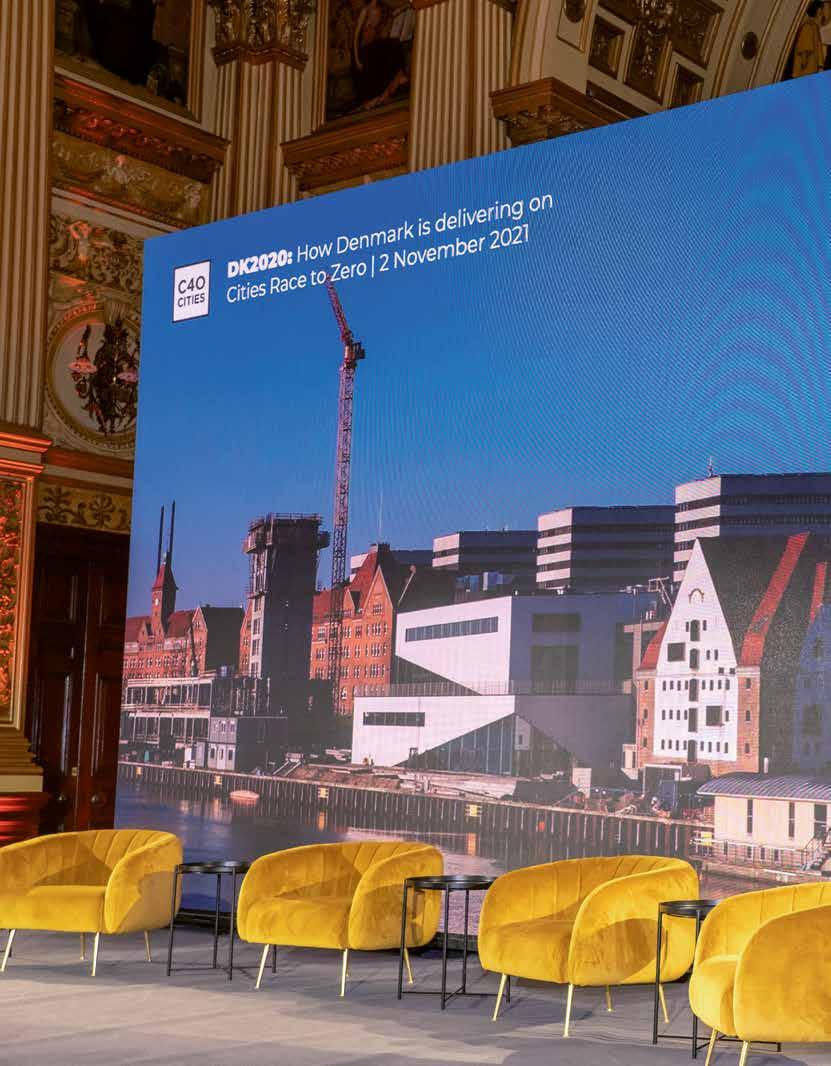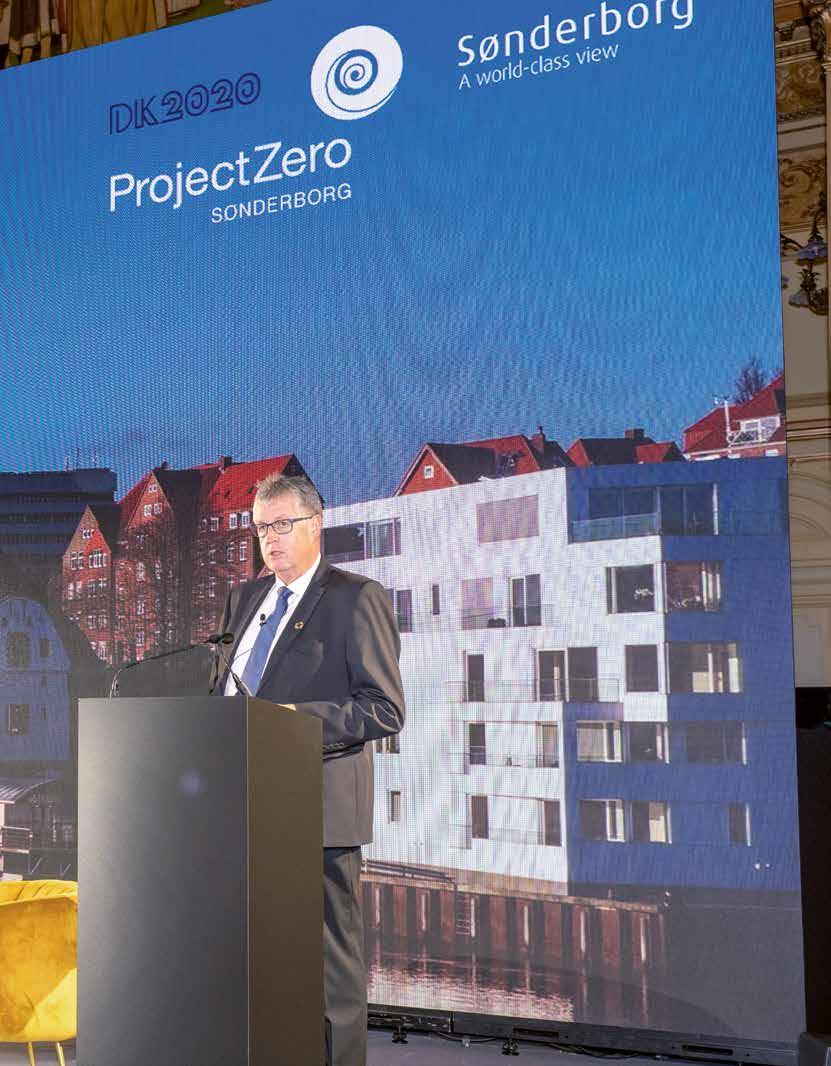
7 minute read
Facts Facts Facts
Organisation
The project is organised with a political partnership group, an administrative steering group, a project steering group, a project management/secretariat function, and five geographical organisational units. CONCITO acts as the overall project secretariat and knowledge partner together with C40.
The political partnership group ensures the political anchoring of the project in KL, the municipalities' contact council (KKR) and the regions:
• 5 political representatives appointed from the municipalities.
• 5 political representatives appointed from the regions.
• 1 political representative appointed by the president of the Climate Alliance.
The administrative steering committee represents the project as a whole and consists of a director from each of the three contributing organisations.
The project steering group is generally responsible for the implementation of the project and consists of an appointed member at executive level from Realdania, KL, the Danish regions, CONCITO, and C40 respectively.
The geographical units consist of the KKR and the region in question. They contribute as cofinancing project partners and ensure the implementation of the project. They provide advice and guidance and facilitate the work of municipalities in developing climate plans.
Work process
The participating municipalities commit to develop and politically support a climate action plan that will show:
• How the municipality as a geographical area will achieve net zero greenhouse gas emissions by 2050.
• What actions the municipality will take to adapt to climate change in order to become climate resilient.
Among other things, municipalities must identify all significant sources of CO2 emissions locally and plan how to deal with them. In addition, the climate action plan must include concrete proposals on how the municipality will adapt to climate change. It is an intensive and demanding process of local capacity building, local stakeholder engagement, planning and negotiation, and political approval before the plan is finally endorsed by the C40.
In the process, municipalities are offered:
• Framework tool to analyse the municipality's climate impact and climate threats/risks, professional sparring, and participation in networks with other municipalities in the region.
• Professional sparring and advice from five geographical units with professional staff from KL/KKR and the region, so that the plans meet international best practice in climate planning.
• Participation in a peer-to-peer concept, where municipalities with similar challenges can support each other and provide peer support to the local programme manager, who in some municipalities may be the only one assigned the task.
'We look at the climate challenge through the framework tool. Then we can see, for example, that there is a question of resilience, in relation to flooding, precipitation, etc., and in relation to greenhouse gas emissions. Once we have identified that, we can see who we need to talk to, for example agricultural interests. We are quietly identifying key stakeholders in relation to where we will get involved, and from there assessing what other agents we need to engage with'.
Boris Schønfeldt, Climate Coordinator, DK2020
Climate neutrality
A climate action plan will develop a course of action that shows the way to a climate-neutral municipality by 2050, including ambitious interim targets.
Climate robustness
A climate action plan should show how the municipality plans to adapt to - and improve its resilience to - climate change, both now and in future climate scenarios.
Inclusion and derived effects
EA climate action plan should engage the local community and describe the social, environmental, and economic benefits and added value that can be expected from implementing the plan and be to ensure a fair distribution of these gains and added values to residents and communties.
Cooperation and governance
A climate action plan should describe the municipality's competences and capacities, as well as the partners to be involved to ensure the achievement of the municipality's climate objectives in both mitigation and adaptation..
Important victories along the way
• It is a great victory that 95 municipalities have joined voluntarily and without earmarked government subsidies.
• It that they have a common language and common experience with a complex climate challenge increases the decision-making power of municipalities. Both within each municipality and across municipalities.
• Municipalities have been given a framework tool with which they are able to analyse, which actors should be at the table.
'I have worked with climate strategies in the past. The solutions were there, but they never translated into any kind of action. All the institutional scaffolding was missing. The holistic approach was missing: What agents do we need to bring into play? Who are the people we need to talk to? What kind of systemic changes are needed? So we talked about everything that was really needed, and that's what the DK2020 framework tool provides'.
Boris Schønfeldt, Climate Coordinator, DK2020
Overview of key elements of a Paris-compatible climate action plan. Source: CONCITO.

Key challenges
• Many of the challenges identified by municipalities are of a regulatory nature, which is why the absence of the state in the partnership is a serious problem.
• There have been big differences in what and how many resources have been available to work with the climate plans in each municipality.
• Municipalities find it frustrating that it is so difficult to measure the impact of climate improvement efforts. The initiative points out that it should be the responsibility of the state to develop a larger platform for municipalities, where the measurement of impact can also be addressed.
• The generally strong political support in municipalities of implementing climate improvements may crumble in future municipal elections. Municipal elections will take place seven more times before 2050, when the targets must be fully met. This requires thinking about how improvements can be handed over, secured, and live on in future political constellations.
• In municipalities, the climate agenda is in competition with growth and jobs. It can be frustrating and counterintuitive to see new climate-challenging workplaces popping up, while many resources are being spent on beneficial environmental measures.
• The implementation of climate plans by municipalities will be a major challenge. There are a number of climate issues over which municipalities have no control, because they cannot be solved locally and political agreements at national level are not yet sufficient.
'Municipalities do not have the instruments to address carbon emissions sufficiently to reach the targets they have set. Our surveys show that municipalities are very concerned about the gaps in their climate action plans – that is, the emissions that the municipality cannot currently address on its own. This is where cooperation with the government is needed. Travel and transport challenges, for example, cannot be solved by municipalities alone. They can solve some of the challenges relating to agriculture, but not all. There are a number of areas that lie outside the municipalities' current scope for action. Therefore, it is absolutely necessary to strengthen the vertical integration between state and municipality'. Pelle Lind Bournonville, Head of Projects, Urban Climate Action, Realdania
Value for partners in the alliance
Municipalities are starting to approach climate more holistically and to think about how to address the challenges in a way that involves all stakeholders. The climate agenda is more embedded across municipal government and responsibility is taken to create change, also outside the areas that the municipality is obliged to take care of. Locally, climate has become a common concern across sectors.
'We have managed to establish a partnership (without the state) which is not all about finances, and which involves partners who really want to do this. It's about making ambitious climate plans that no one is compelled to do, but which the municipalities themselves really want to do. All this is happening despite the lack of legislation and frameworks from the government. It's amazing that a foundation can make extremely significant systemic changes and push forward a development that is unique, also on a global level'. Christian Ibsen, Director, CONCITO
Essential learning
DK2020 and the action framework have provided the municipalities with instruments and a focus on how important it is that all stakeholders are involved when working on climate action, a job that has to be done intersectorally.
There is an emerging interest in municipalities to instigate a new type of dialogue with the general population on climate issues. A move towards more genuine involvement, inviting people to discuss the challenges and not simply to take a position on a pre-defined solution. This will create more sustainable solutions with broad ownership.
'We used to focus on municipalities respecting the law and being efficient. But that's not enough when we have to tackle complex challenges. Then we need to work more broadly with various sectors of society. This makes both society itself and the solutions decided on more robust'.
Boris Schønfeldt, Climate Coordinator, DK2020
The key agencies involved in DK2020 are aware that the state is not a partner in DK2020 and are aware that it is crucial for future implementation that the state become part of the project.
'The systemic challenge in Denmark is that it's all about money, about the relationship between municipalities and the state and the usual discussions about financial frameworks, etc. This project has succeeded precisely because we have got around all that... [...] But that does not change the fact that we must try to get the state involved in ensuring a better framework and removing the barriers that currently stand in the way of the municipalities' climate efforts. We must try to find a way for the state to help municipalities much more'.
Christian Ibsen, Director, CONCITO
Results
• DK2020 responded at the right time to a clear municipal need for a methodology to support a climate plan. A tool that did not exist, even at a time when climate was seriously on the agenda.
• 20 municipalities currently have a C40-approved climate action plan. These include a focus on phasing out oil and gas furnaces, green mobility, climate adaptation, partnerships, green jobs, car-sharing schemes and working with local businesses and citizens to reduce greenhouse gas emissions.
• 96 municipalities have developed, or are in the process of developing, climate plans that meet the Paris Agreement.
'It has gone much better than we at Realdania probably expected. And this is proof that the organisation we have put in place and the political interest that followed in its wake have worked. The evidence of a commitment to join the venture has been a real, not just an apparent victory. The second big victory is more internal. The partnership that has emerged - KL and the regions getting round the table and wanting to get this done this together. That has been the prerequisite for the first victory. No one could have done this alone'.
Pelle Lind Bournonville, Project Manager, Urban Climate Action, Realdania






